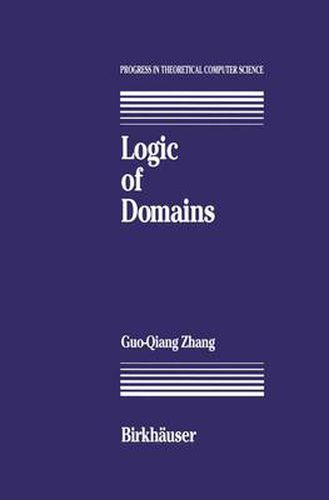Readings Newsletter
Become a Readings Member to make your shopping experience even easier.
Sign in or sign up for free!
You’re not far away from qualifying for FREE standard shipping within Australia
You’ve qualified for FREE standard shipping within Australia
The cart is loading…






This title is printed to order. This book may have been self-published. If so, we cannot guarantee the quality of the content. In the main most books will have gone through the editing process however some may not. We therefore suggest that you be aware of this before ordering this book. If in doubt check either the author or publisher’s details as we are unable to accept any returns unless they are faulty. Please contact us if you have any questions.
This monograph studies the logical aspects of domains as used in de notational semantics of programming languages. Frameworks of domain logics are introduced; these serve as foundations for systematic derivations of proof systems from denotational semantics of programming languages. Any proof system so derived is guaranteed to agree with denotational se mantics in the sense that the denotation of any program coincides with the set of assertions true of it. The study focuses on two categories for dena tational semantics: SFP domains, and the less standard, but important, category of stable domains. The intended readership of this monograph includes researchers and graduate students interested in the relation between semantics of program ming languages and formal means of reasoning about programs. A basic knowledge of denotational semantics, mathematical logic, general topology, and category theory is helpful for a full understanding of the material. Part I SFP Domains Chapter 1 Introduction This chapter provides a brief exposition to domain theory, denotational se mantics, program logics, and proof systems. It discusses the importance of ideas and results on logic and topology to the understanding of the relation between denotational semantics and program logics. It also describes the motivation for the work presented by this monograph, and how that work fits into a more general program. Finally, it gives a short summary of the results of each chapter. 1. 1 Domain Theory Programming languages are languages with which to perform computa tion.
$9.00 standard shipping within Australia
FREE standard shipping within Australia for orders over $100.00
Express & International shipping calculated at checkout
Stock availability can be subject to change without notice. We recommend calling the shop or contacting our online team to check availability of low stock items. Please see our Shopping Online page for more details.
This title is printed to order. This book may have been self-published. If so, we cannot guarantee the quality of the content. In the main most books will have gone through the editing process however some may not. We therefore suggest that you be aware of this before ordering this book. If in doubt check either the author or publisher’s details as we are unable to accept any returns unless they are faulty. Please contact us if you have any questions.
This monograph studies the logical aspects of domains as used in de notational semantics of programming languages. Frameworks of domain logics are introduced; these serve as foundations for systematic derivations of proof systems from denotational semantics of programming languages. Any proof system so derived is guaranteed to agree with denotational se mantics in the sense that the denotation of any program coincides with the set of assertions true of it. The study focuses on two categories for dena tational semantics: SFP domains, and the less standard, but important, category of stable domains. The intended readership of this monograph includes researchers and graduate students interested in the relation between semantics of program ming languages and formal means of reasoning about programs. A basic knowledge of denotational semantics, mathematical logic, general topology, and category theory is helpful for a full understanding of the material. Part I SFP Domains Chapter 1 Introduction This chapter provides a brief exposition to domain theory, denotational se mantics, program logics, and proof systems. It discusses the importance of ideas and results on logic and topology to the understanding of the relation between denotational semantics and program logics. It also describes the motivation for the work presented by this monograph, and how that work fits into a more general program. Finally, it gives a short summary of the results of each chapter. 1. 1 Domain Theory Programming languages are languages with which to perform computa tion.